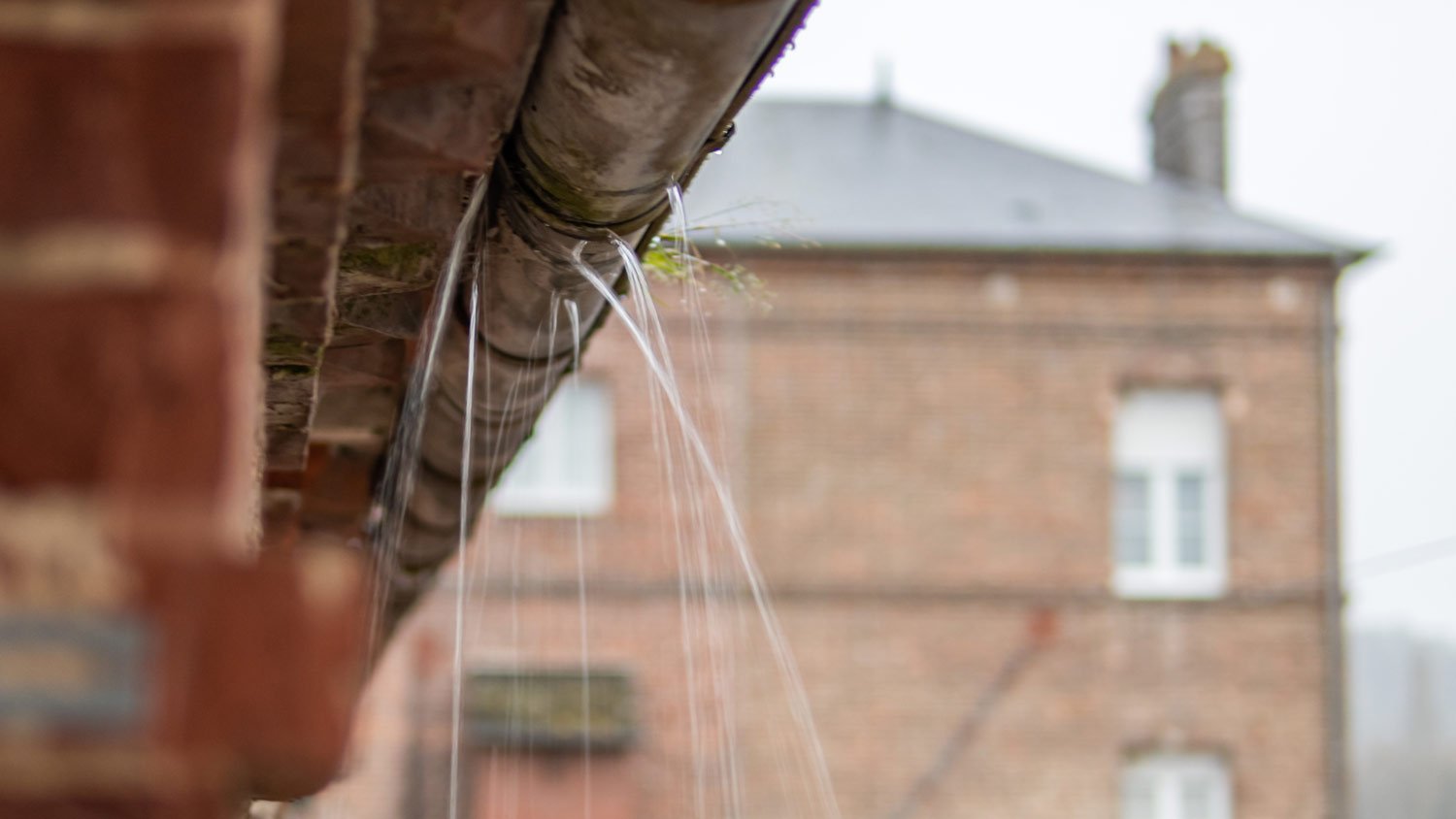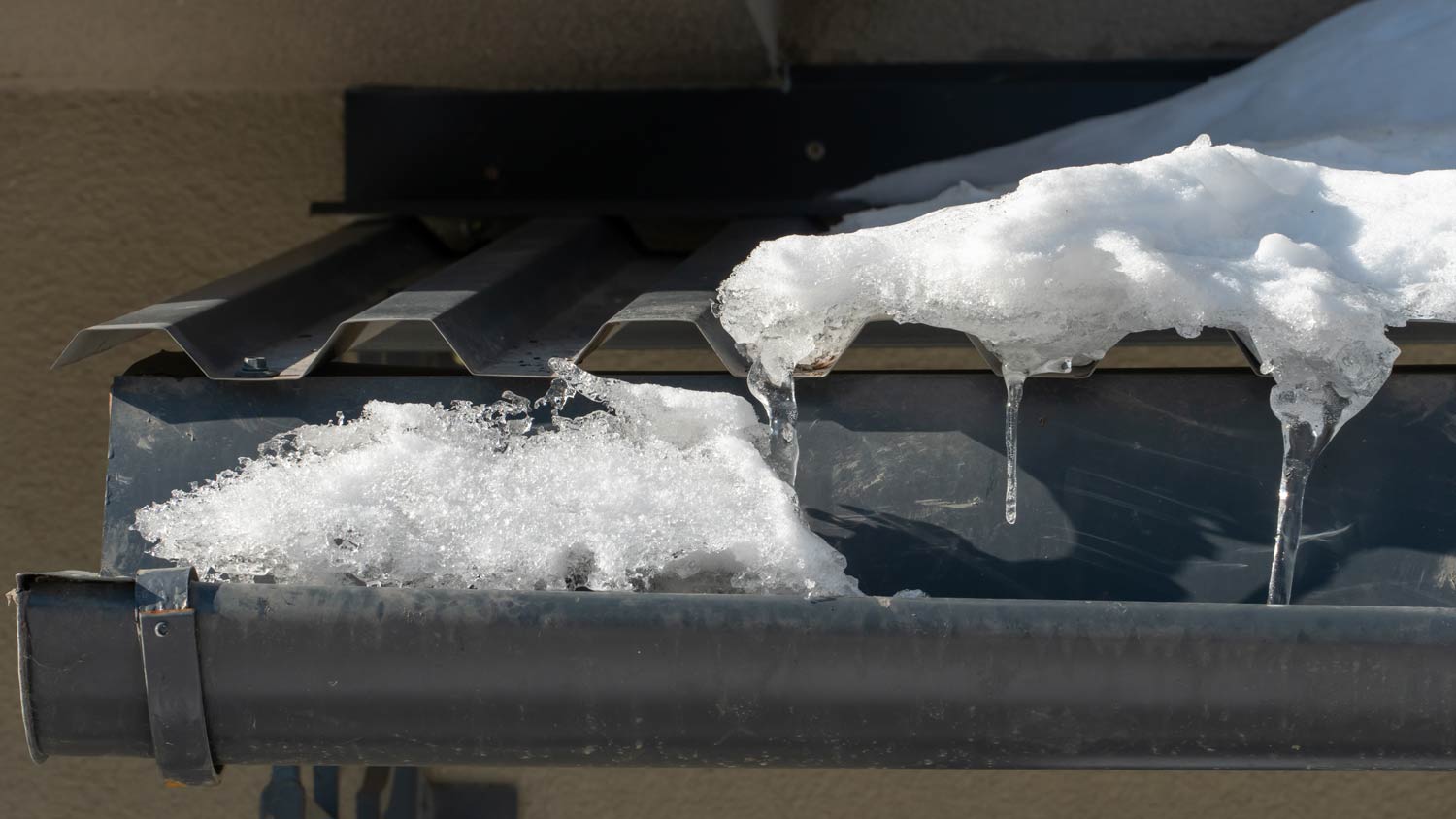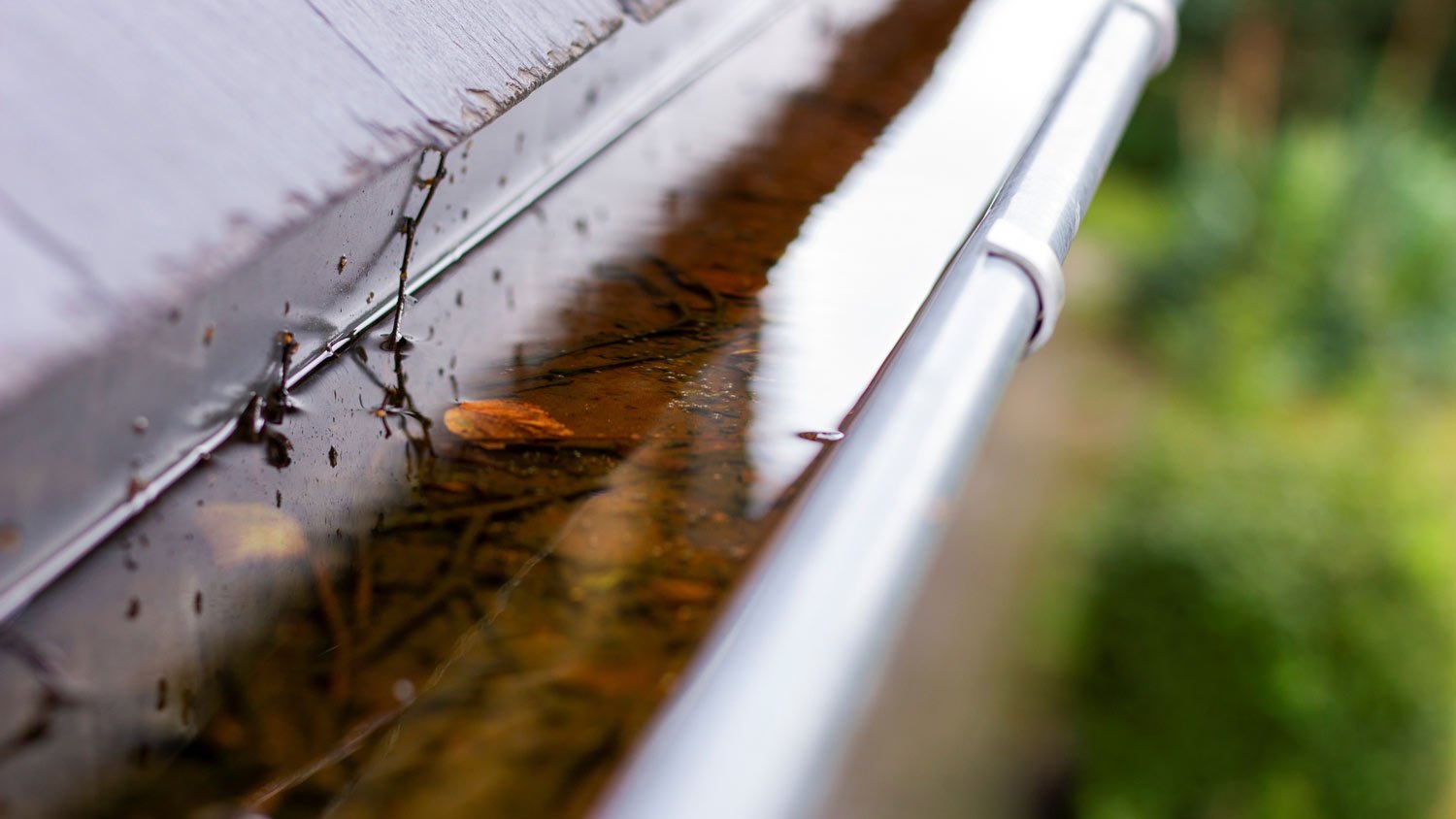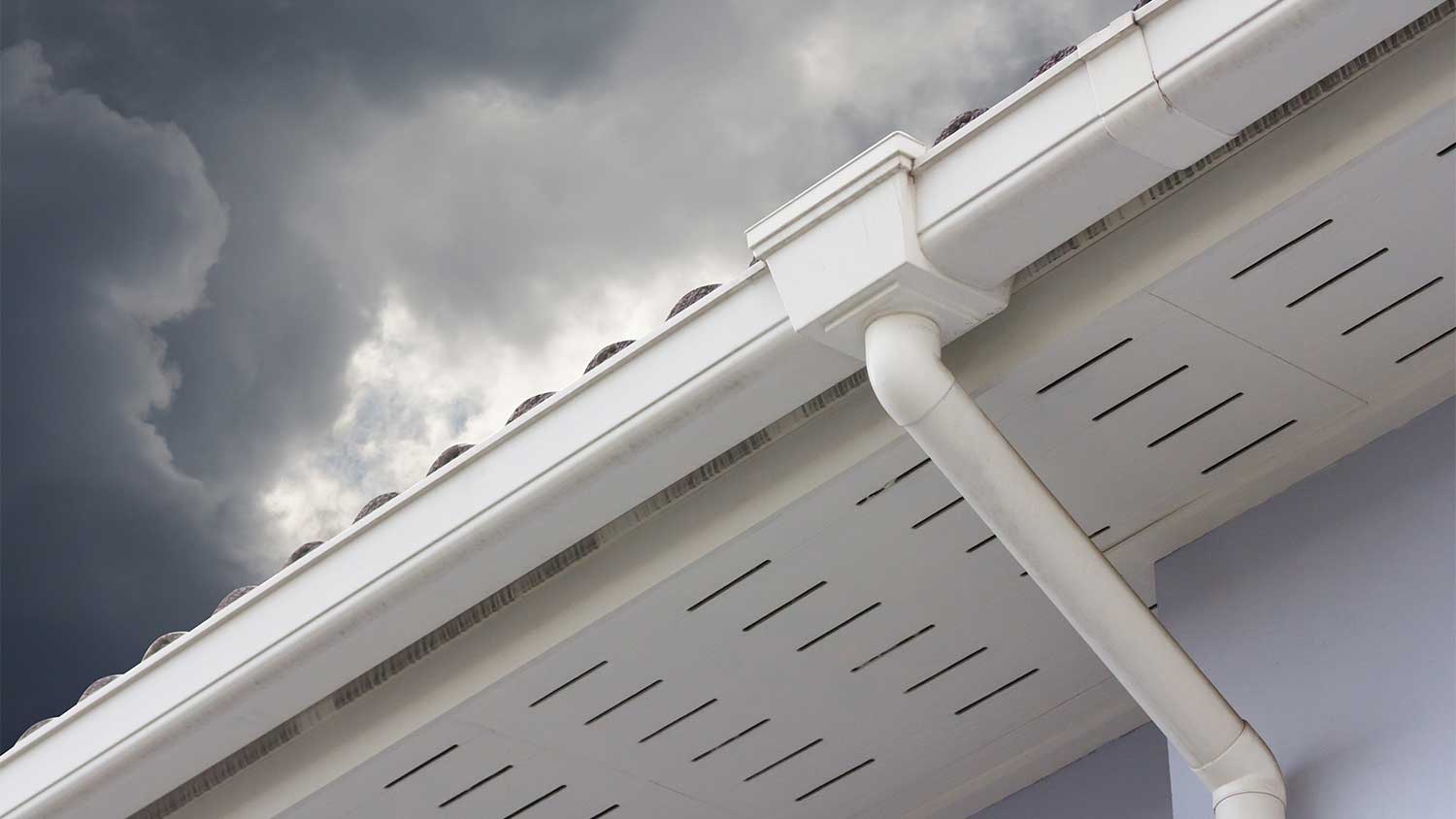8 Common Metal Roof Gutter Problems
See how gutters can affect your metal roof


Water flows faster down metal roofs.
Gutters cost around $170 to clean.
Clogged gutters can cause a gutter system to detach from metal roofs.
Untreated faulty gutters can damage the metal on your roof.
Check your gutters routinely for signs of clogs, corrosion, damage, and misalignment.
Not much can beat the relaxing sound of rain as it strikes a metal roof. But if every time you hear the soothing sounds of your metal roof in a thunderstorm makes you feel worried about your home’s gutter system, it might be time to take out the old handbook and figure out what’s going on with your metal roof’s gutter. We’ve rounded up eight common metal roof gutter problems to help you relax in time for the next rain shower.
1. Gutter Leaks

Leaky gutters on a metal roof can happen for all kinds of reasons, but one thing they all have in common is that leaving the leak untreated puts your home at risk of mold, water damage, foundation problems, infestations, and landscaping damage. It can also cause your metal roof to corrode from frequent exposure to moisture.
How to Fix It:
How you go about fixing leaky gutters on a metal roof largely depends on what's causing the leak. Here are some of the most common reasons why gutters leak:
They’re clogged.
The slope is incorrect.
Impact, ice, or snow weighed them down and caused bends.
They’re damaged and need repairing.
If you’re unable to repair faulty gutters, then you may need to replace your gutters. The average cost to replace gutters is $1,150.
2. Clogs in the Gutters
Clogs are a cause of overflowing gutters, but they can also cause other issues with your home. All that debris that builds up in your gutters from the great outdoors can really weigh the gutters down. This can lead to your gutters detaching from the roof, which may even damage your roofing material or gutters if you don't take care of the issue promptly.
How to Fix It:
Fortunately, clogged gutters are an easy fix—albeit not the most pleasant Saturday chore. Gutter cleaning is a staple gutter maintenance task that is best done every autumn and possibly more depending on the number of trees in your yard.
If you don’t want to climb up on a ladder and scoop away the gunk in your gutters, you can hire a local gutter cleaning specialist to take care of the job for you. The cost to clean gutters ranges from $120 to $230 or around $170 on average.
3. Sagging and Loose Gutters

Loose gutters can tug away at your metal roof and also cause leaks. If loose gutters go untreated for too long, then they might start to sag and really detract from your home's curbside appeal.
How to Fix It:
The first step to fixing sagging, loose gutters is to check and make sure that the gutters aren't clogged or weighed down in any way. If your gutters are squeaky clean, then your next course of action is to check the screws and fasteners to ensure they're in their correct placement. Depending on the type of gutter system, you’ll need to either tighten loose screws with a screwdriver or replace old, damaged, or rusty spikes as needed.
4. Corrosion Damage
Corrosion and rust go hand-in-hand with metal exposed to the elements—especially if you live in a coastal region where your home’s metal roof comes in contact with seawater. Depending on the type of gutter material you have on your home, you might have a double whammy when it comes to corrosion issues. Steel gutters and aluminum gutters are rust-resistant but can rust if exposed to frequently moist conditions.
Likewise, if you don’t maintain your metal roof or gutters, rust can develop and weaken the material.
How to Fix It:
The key to fixing corroded metal is knowing when it’s best to repair your metal gutters or roofing and when it’s time to replace them. You can prevent rust from developing on your home by routinely inspecting, cleaning, and coating your gutters in rust-resistant sealants. Another way to avoid rust issues is by choosing rust-resistant gutter materials like vinyl gutters instead of aluminum.
If it’s time to replace your old gutters, consider working with a gutter company near you to professionally remove and install new gutters.
5. Snow and Ice Damage

For some homeowners, autumn isn't the only season to watch out for when it comes to metal roof gutter problems. Winter snow storms and icy weather can cause a phenomenon called ice dams to develop on your roof and gutters. If you see icicles hanging precariously from your roof or gutters, this winter wonderland spectacle could quickly turn into a gutter nightmare.
How to Fix It:
Knowing how to thaw frozen gutters can get your gutters on the right track toward staying in place no matter the weather. Climbing on an icy roof is a no-go, but you can still stand on the ground and use a roof rake to try to remove some of the ice from your gutters. You can also prevent ice in your gutters by insulating them, installing snow guards, or installing heated gutters.
6. Susceptibility to Temperature Changes
Metal roofs are prone to expanding and contracting depending on outdoor temperatures. This can cause your gutters to loosen or tighten when temperatures drastically change.
How to Fix It:
Knowing that your metal roof will shift throughout the seasons and taking preventative measures to ensure that your gutters remain in place is a relatively easy fix. When temperatures drop or increase quickly, it’s a good time to inspect your gutter system and tighten or loosen the hardware as needed.
7. Poor Sloping

Inadequate sloping can cause the water to stay flat in your gutters. This is bad for several reasons. Namely, water has nowhere to go but out the sides of your gutters and straight between the gutters and fascia or into the landscape below—you can practically kiss your prized garden beds goodbye. Secondly, a flat slope can cause standing water in your gutters, making it the perfect environment for insects.
How to Fix It:
Fixing gutter drainage issues from an incorrect slope comes down to checking the pitch of your gutters and making sure they’re on a steady course toward the downspouts in your system. Your gutters should slope downwards around 1/2 to 1/4 inches for every 10 linear feet. If the highest point of your gutters isn’t much taller than the lowest point where the downspouts are, then you’ll need to adjust the slope.
8. Insufficient Downspouts
Having the correct number of downspouts on your gutter system can look different for metal roofs than it does for asphalt roofs for one simple reason—metal roofs are slippery. When it rains, that slippery surface allows for water to cascade down faster than it would on more textured surfaces.
How to Fix It:
The simple solution is to install more downspouts to allow for the water to travel to several points of access. Doing so will take some of the pressure off the few downspouts your gutter system currently has and help prevent the gutters from overflowing.
Frequently Asked Questions
While you don't technically need different gutters for metal roofs than you do for other types of roofs, most metal roofs use a half-round or K-style gutter system. On top of that, your gutters will need more brackets than homes that have shingle roofs since the gutters won’t fit as flush against the fascia as they would against traditional roofing systems, where they’re installed to the roof deck.
Snow and ice can both accumulate on the top of a metal roof and slide off as the weight of the snow increases or as the snow and ice melt. This can rip the gutters off your roof and damage the gutters or the roof if you don’t take preventative measures. Snow guards are one of the easiest methods for helping to prevent snow accumulation on your metal roof from damaging your gutters.
The best gutter types for metal roofs are half-round gutters and K-style gutters. These gutter styles attach to the fascia with the use of hidden hangers, since there aren’t shingles to attach the gutters to metal roofs. Seamless gutters are also a good choice for metal roofs, as this type of gutter is custom-made to provide your home with the best fit. This helps prevent the gutters from shifting or leaking.





- Why Is Water Leaking Between the Gutter and Fascia?
- 5 Reasons for Overflowing Gutters and How To Fix It
- 3 Best Types of Gutters for Metal Roofs
- Why Your Gutters Are Pulling Away (and How to Fix Them)
- How Long Do Gutters Last? Learn When Should Your Gutters Be Replaced
- Who to Call When Your Gutter Leaks
- A Clogged Gutter Can Lead to a Damaged Foundation—Here’s Why
- 10 Signs Your Gutters Were Installed Incorrectly
- A Complete Guide to Gutter Sizes, Placement, and Styles
- What Are the Different Types of Gutters? [2024 Guide]










